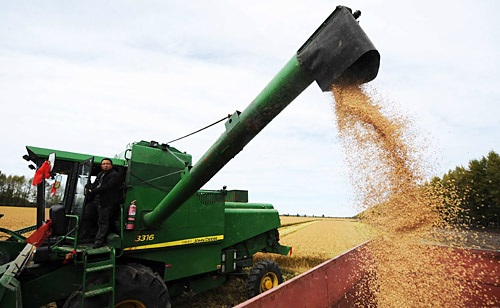|
 |
|
HEFTY HARVEST: A grain combine puts paddy rice into a truck in the No.856 Farm in Heilongjiang Province on September 18. Known as the grain barn for China, Heilongjiang has secured a bumper grain harvest for seven consecutive years (WANG JIANWEI) |
China-ASEAN Expo
More than 2,000 foreign and domestic enterprises took part in the Seventh China-ASEAN Expo, which opened in Nanning, capital of south China's Guangxi Zhuang Autonomous Region, on October 19. The expo lasted for six days.
The event had a total of 4,600 exhibition booths, all for exhibitors from China and the 10 members of the Association of Southeast Asian Nations (ASEAN).
The zero-tariff framework under the China-ASEAN Free Trade Area, established on January 1 this year, has made the expo more attractive for participants from Southeast Asia.
Super-speed Railways
China has commenced research on "super-speed" railway technology, said the Ministry of Railways (MOR) on October 19.
The new technology will increase the average speed of trains to over 500 km per hour, said MOR chief engineer He Huawu.
The 400-500 km/h high-speed railway technology is in its final phase of development and 380-km/h trains are already rolling off production lines, He added.
As of September, China has put 7,055 km of high-speed railway tracks—the longest in the world—into service, and the total length is expected to hit 13,000 km by 2012.
SOE Profits Up
Profits of China's state-owned enterprises (SOEs) stood at 1.44 trillion yuan ($216.4 billion) in the first three quarters of 2010, up 46.2 percent from the same period of last year, according to the Ministry of Finance (MOF).
SOEs' revenue totaled 21.9 trillion yuan ($3.29 trillion) during the same period, up 35.3 percent from a year earlier. The figure for September alone was 5-percent higher than the August level.
In the first nine months, SOEs paid 1.83 trillion yuan ($275.1 billion) in taxes, up 23.9 percent year on year, the MOF said.
China's SOEs consist of SOEs directly controlled by the Central Government and SOEs supervised by local governments, but exclude state-owned financial enterprises.
Clean Energy Disputes
China's Ministry of Commerce (MOFCOM) has expressed "regret" over a U.S. Government decision to investigate China's renewable energy policies and said it would defend its interests in accordance with WTO rules.
The Office of the U.S. Trade Representative started the investigation on October 15 in response to the United Steelworkers union's complaint on September 9 that China's support for its renewable energy industries gave Chinese producers an unfair advantage over competitors.
"The union's complaint is groundless and irresponsible" as both parties should act in line with WTO rules, said the Bureau of Fair Trade for Imports and Exports of MOFCOM.
The United States was subsidizing up to 2,300 energy-related programs, which made the U.S. criticism of other country's environmental efforts unjustifiable, said the MOFCOM.
Baidu's Growth
China's Internet search market in the third quarter grew 59 percent over the previous year as the country's leading search engine operator, Baidu Inc., continued to devour Google Inc.'s market share, according to technology research firm iResearch.
China's search market rose to 3.13 billion yuan ($471 million) in revenue in the third quarter, with Baidu taking 72.9 percent of the market. Google's share slid to 24.6 percent.
China is the world's largest Internet market in terms of users with more than 400 million. | 